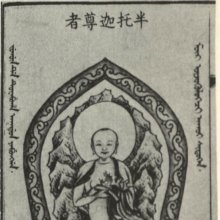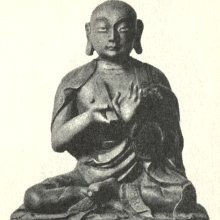Panthaka: 9 definitions
Introduction:
Panthaka means something in Buddhism, Pali, Hinduism, Sanskrit. If you want to know the exact meaning, history, etymology or English translation of this term then check out the descriptions on this page. Add your comment or reference to a book if you want to contribute to this summary article.
Images (photo gallery)
In Buddhism
Theravada (major branch of Buddhism)
Source: Pali Kanon: Pali Proper Names1. see Cula Panthaka and Maha Panthaka.
2. Mentioned as the name of a man. J.i.403.
Theravāda is a major branch of Buddhism having the the Pali canon (tipitaka) as their canonical literature, which includes the vinaya-pitaka (monastic rules), the sutta-pitaka (Buddhist sermons) and the abhidhamma-pitaka (philosophy and psychology).
Languages of India and abroad
Pali-English dictionary
Source: BuddhaSasana: Concise Pali-English Dictionarypanthaka : (m.) a wayfarer; traveller.

Pali is the language of the Tipiṭaka, which is the sacred canon of Theravāda Buddhism and contains much of the Buddha’s speech. Closeley related to Sanskrit, both languages are used interchangeably between religions.
Sanskrit dictionary
Source: DDSA: The practical Sanskrit-English dictionaryPanthaka (पन्थक).—a. Produced in or on the way.
Source: Cologne Digital Sanskrit Dictionaries: Edgerton Buddhist Hybrid Sanskrit DictionaryPanthaka (पन्थक) or Cūḍa-panthaka.—q.v. (younger brother of Mahā-p°): Divyāvadāna 485.28 ff.
Source: Cologne Digital Sanskrit Dictionaries: Shabda-Sagara Sanskrit-English DictionaryPanthaka (पन्थक).—mfn.
(-kaḥ-kā-kaṃ) Produced in or on the road. E. pathin, and vun aff.
Source: Cologne Digital Sanskrit Dictionaries: Monier-Williams Sanskrit-English Dictionary1) Panthaka (पन्थक):—[from panth] mfn. produced in or on the way, [Pāṇini 4-3, 29]
2) [v.s. ...] m. Name of a Brāhman, [cf. Lexicographers, esp. such as amarasiṃha, halāyudha, hemacandra, etc.]
Source: Cologne Digital Sanskrit Dictionaries: Yates Sanskrit-English DictionaryPanthaka (पन्थक):—[(kaḥ-kā-kaṃ) a.] Of the road.
[Sanskrit to German]
Sanskrit, also spelled संस्कृतम् (saṃskṛtam), is an ancient language of India commonly seen as the grandmother of the Indo-European language family (even English!). Closely allied with Prakrit and Pali, Sanskrit is more exhaustive in both grammar and terms and has the most extensive collection of literature in the world, greatly surpassing its sister-languages Greek and Latin.
See also (Relevant definitions)
Starts with: Pantakam, Pantakapattiram.
Ends with: Apanthaka, Chudapanthaka, Chulapanthaka, Cudapanthaka, Culapanthaka, Cullapanthaka, Mahapanthaka, Paripanthaka, Shuddhipanthaka.
Full-text: Paripanthaka, Panthalika, Paripanthitva, Paripanthibhu, Mahapanthaka, Paripantham, Paripanthaya, Apanthaka, Mushikahairanyika, Paripanthin, Cudapanthaka, Pantha, Paripanthika, Dvadashavargiya, Culapanthaka, Padumuttara, Vun.
Relevant text
Search found 12 books and stories containing Panthaka; (plurals include: Panthakas). You can also click to the full overview containing English textual excerpts. Below are direct links for the most relevant articles:
Dhammapada (Illustrated) (by Ven. Weagoda Sarada Maha Thero)
Verse 407 - The Story of Venerable Mahā Panthaka < [Chapter 26 - Brāhmaṇa Vagga (The Brāhmaṇa)]
The Jataka tales [English], Volume 1-6 (by Robert Chalmers)
Fundamentals of Vipassana Meditation (by Venerable Mahāsi Sayādaw)
The Great Chronicle of Buddhas (by Ven. Mingun Sayadaw)
Biography (11-12): Two Panthaka Mahātheras < [Chapter 43 - Forty-one Arahat-Mahatheras and their Respective Etadagga titles]
Apadana commentary (Atthakatha) (by U Lu Pe Win)
Commentary on Biography of the thera Cūḷapantha < [Chapter 2 - Sīhāsaniyavagga (lion-throne section)]
Vinaya (3): The Cullavagga (by T. W. Rhys Davids)
Cullavagga, Khandaka 6, Chapter 21 < [Khandaka 6 - On Dwellings and Furniture]
Related products

